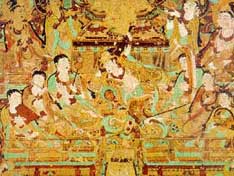
The first "Dunhuang Fresco Instruments Show" opened in Beijing, 180 replicated musical instruments from the frescos.
Flying Chinese Apsaras: Mythic fairies dancing and playing celestial music is a common tableau from the Dunhuang fresco. But what were the ancient musical instruments like and could they be replicated? A reporter from Star Daily went to the opening of the first "Dunhuang Fresco Instruments Show" at the Huating Mansion in Beijing to find out and saw 180 replicated musical instruments from the spectacular frescos.
Zheng Ruzhong, an expert from the Dunhuang academy says, "Dunhuang culture is extensive but most people just understand it from the flying Apsaras, but it's really far more than that."
In the exhibition, there are all kinds of instruments -- including wind, stringed, and percussion instruments, in which many have never be shown to the public. Except for the pipa (balloon guitar), a famous ancient instrument in China, most are unfamiliar to ordinary people. It's said that many folk instruments have been lost but can still be seen in the records of history.
Zhang Yongjun, the sponsor of this exhibition, said they'd been preparing for this exhibition for many years. The Dunhuang music instruments study and duplicate began early in 1988. The "Dunhuang fresco instrument study and duplicate project," which was sponsored by the Dunhuang academy, was appraised by an 18-person appraisal committee after an excellent performance with 54 duplicated instruments. In the last 11 years, experts of the 54 instruments have duplicated 180 instruments in 44 groups, and studying and duplication has now finished.
According to experts, in the 492 Mogao grottoes, there are 240 dance and music grottoes. The frescoes there show 4,000 instruments in 44 groups, 3,000 performers, and 500 groups of bands of all kinds.
Zheng said that this is not only an exhibition -- they also invited many musicians to perform on the instruments in order to show the differences and similarities of ancient and contemporary music. Many of the instruments were made of expensive material - a rosewood zither cost 10,000 yuan.
In addition to this exhibition, the sponsor said they would hold a performance outside the Mogao Grottoes with instruments and replica costumes from the fresco. The performance will include ancient music that revives the songs and dances of thousands of years ago. It will be held on August 22, next year.
(China.org.cn November 28, 2003)
|

